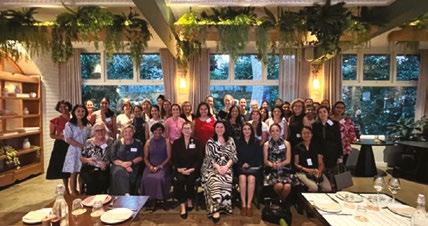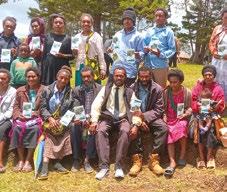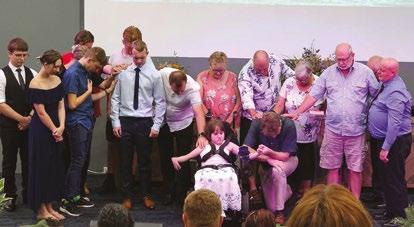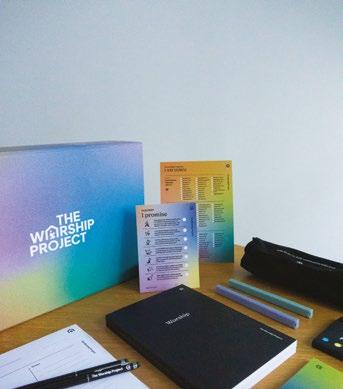

Is it time to power down to power up? 14
Who are our pastors? Responses to global survey revealing 7
Adventist Record | April 6, 2024 ISSN 0819-5633
Scroll

Health and Hope your monthly source of Scan for more Signs of the Times is a monthly magazine focused on current issues, holistic health and authentic Christian faith. WisdomforDailyLife Inspiring Stories Practical Tips SUBSCRIBE NOW Receive 11 issues for just $28 per year

EDITOR’S NOTE:
Rise of the machines: I see ChatGPT everywhere
Juliana Muniz News editor
A few seconds into the video, the person sharing the message had completely lost me. I can’t connect with a message that has been crafted by a robot.
I need to get this off my chest: ChatGPT is starting to give me “the ick”. It has even caused me to mute some friends on social media. There. I’ve said it.
If you know someone and have talked to them in real life, you know what they sound like. If you’ve exchanged words with anyone, you know what normal speech sounds like. And it’s not exactly how ChatGPT sounds. Do you really use words such as unwavering, beacon of hope, delve, underscores, realm, etc, in your 21st century conversations?
Don’t get me wrong. I don’t think we should stop using ChatGPT. Generative artificial intelligence (AI) is here to stay and it’s beneficial to understand how to properly use it if we want to have a place in our future society. According to the Microsoft Work Trends Index 2023, 82 per cent of leaders say their employees will need new skills to be prepared for the growth of AI.
I attended South By Southwest (SXSW) Sydney in October last year—if you’re not familiar with it, the event is basically “the world’s fair for creative content industries”. The event ran for a week and had industry specialists from all around the world speaking on many topics related to innovation, many focused on communication, media and the future of work. The most discussed topic? You guessed it! AI.
One of the biggest concerns surrounding AI at that event was the question “Is AI coming for my job?” Good news: it’s not. But it’s definitely coming for your job description.
AI—which, by the way, is not new; it has been around since the 1950s—is part of our reality now, and it WILL change how we live and work. But my biggest concern, and the reason for my ick, is whether it will also change the way we communicate.
Yes, it is great to have ChatGPT to help tone down that email that would’ve sounded too passive-aggressive, or even to help those who don’t have English as their native language communicate better—it can do a pretty good job as a translator. But the indiscriminate use of this tool to craft social media posts, articles or even text message replies is starting to make us sound like robots. We run the risk of losing the ability to truly connect with people. And how does that help us in the great commission?
This year my husband and I have started using the YouVersion Bible app daily devotional every morning. It features a verse of the day, a short video from a different guest diving into the meaning of that verse, followed by a written devotional. Recently, while watching one of those videos, the person presenting it started using words such as “unwavering”, “beacon of hope” and all the robotic ChatGPT vocabulary. A few seconds into the video, the person sharing the message had completely lost me. I can’t connect with a message that has been crafted by a robot.
Maybe he wrote it himself and then asked ChatGPT to refine it? That’s a possibility. But if the message is not presented in a way that resonates with people, it won’t have meaning. It’s like when Paul advised the Corinthians about speaking in tongues. If we speak in a way that is not clear enough to be understood, we “will be speaking into the air” (1 Corinthians 14:9). At first glance, ChatGPT can sound like heavenly generated words, which seem amazing, but if we don’t interpret it, edit it, make it sound more human, we are missing the real benefit of inter-human connections.
The unanimous conclusion of the specialists at SXSW who discussed “The future of Journalism, publishing and truth in the age of AI” and other “AI vs humans” panels I attended was that AI won’t and should never replace some specific professionals. AI is biased, has no concept of fairness and no objectivity. Someone actually said in those panels that we now need real journalists more than ever.
As Seventh-day Adventists, I believe it applies to us as well. In a world where technology has the potential to make us lose our human touch, we need dedicated pastors, leaders and members; we need real Christians to share the Real—and True—God. Now more than ever.
3 April 6, 2024 | Adventist Record
 INSIGHT:
INSIGHT:
Television that changes lives
Dr Brad Kemp CEO, Adventist Media




Hope Channel began broadcasting in North America in 2003. Today, Hope Channel is a global network with more than 80 channels, each creating content in their own local language totalling more than 80 languages so far.
And here in the South Pacific Division, Hope Channel reaches hundreds of thousands of people every day, whether it be on the Vast platform in Australia, free-toair and satellite in New Zealand, or through a variety of platforms across Fiji, American Samoa, Samoa, French Polynesia, Kiribati, Tonga and Solomon Islands. And just last month Vanuatu became the 84th Hope Channel when it opened its new studio and broadcast centre.
What are the benefits of Hope Channel you may be asking? I’ll let Adelaide tell you. “I started becoming curious about where God was, and my life. So I started flicking through all the channels on the TV and saw Hope Channel. And WOW! Questions I had in my mind were being answered more or less when I switched on the channel. It just became the only thing that we would be watching on TV. And this led me to the Seventh-day Adventist Church.”
Hope Channel provides an Adventist voice in the community. It gives a positive message of our Church. It shares the Adventist message. Hope Channel changes lives.
Every week you are asked to support one cause or another. At least 26 times a year your offering supports your local church. But only once each year do we invite you to support the work and ministry of Hope Channel.
One of the goals Hope Channel has set is to reach 1 billion people by 2030. But it can only do this with your support.
Across Australia, NZ and the Pacific Islands, Hope Channel is being broadcast every day. It is speaking into the homes of hundreds of thousands of families sharing messages of hope. And it is reaching people like Adelaide.
Chances are Hope Channel is sharing messages of hope into your community.
Please support this ministry with your offering and gifts this Sabbath, and thank you for your support and for being part of this life-changing ministry.


4 Adventist Record | April 6, 2024 ADVENTIST HEALTH INSURER acahealth.com.au Because we care... Contact Us 1300 368 390 *Terms & Conditions apply, see website. Valid to 30/04/2024 Get 4 weeks free membership with any Combined Hospital & Extras Cover* DO YOU HAVE PRIVATE HEALTH INSURANCE?


New ministerial secretary for AUC
Ringwood, Vic | Kymberley McMurray
The appointment comes after the former ministerial secretary Dr Brendan Pratt accepted the call to be the new director of the global mission centre for secular and post-Christian mission as well as an associate ministerial secretary for the AUC.
Pastor Peterson comes with a diverse range of experience, starting out as an intern at Kellyville church and then senior pastor for Chatswood church in Sydney, before becoming the Sabbath school and stewardship director for Greater Sydney Conference and then Sabbath school, stewardship and personal ministries director at the AUC until 2021 when she became director of Sabbath School, stewardship and associate ministerial secretary.
AUC president Pastor Terry Johnson said, “God has a plan for each of our lives and it’s wonderful to see how God has directed the ministerial pathway for Pastor Lyndelle Peterson. [In all of Lyndelle’s roles] she has excelled including as the associate ministerial secretary where she’s learned and gained experience in the requirements necessary to lead across our nine conferences with the excellent ministerial team leaders that we are blessed with. May the Lord continue to bless her ministry as He’s expanded the scope of His calling in her life.”
Replacing Pastor Peterson as stewardship and Sabbath school director is Pastor Nicu Dumbrava who is currently serving as personal ministries director and pastor for Hughesdale Seventh-day Adventist Church in Melbourne, Vic. Pastor Dumbrava will continue serving as personal ministries director while also undertaking this new role.
Pastor Dumbrava served as pastor for the South NSW Conference for eight years before moving to WA where he served as pastor and personal ministries, church planting and Sabbath school director. In 2021, he became personal ministries director for the AUC.
Pastor Johnson said, “Sabbath school and stewardship has been ably and innovatively led by Pastor Lyndelle and we know that the same will be true of Pastor Nicu who has a proven track record in SNSW, WA and Victoria in personal ministries along with having led that department for the past three years. These are two important departments at the heart of discipleship and Nicu is excited about the opportunity. We wish God’s blessing on him!”
making headlines
Kid rescuers
Belém Adventist Hospital in Brazil trained more than 34 children aged 8-13 in life-saving first aid techniques through the “Angels Socorristas” project, showcasing the potential of youngsters in emergency response situations. With theoretical and practical sessions led by specialists, a newfound interest in healthcare careers was fostered among the junior rescuers during the 20-hour course.—SAD

Serving spaghetti
Ephesus Adventist Church (US) are passionate about their local community. Known as the “Spaghetti Church”, every Monday they provide free clothes and shoes, showers and plates of hot spaghetti, and monthly have a food pantry for guests to choose from fresh produce, canned goods, hygiene products and more.—NAD
Divine desserts
Established in 1967, an iconic icecream parlour owned by the Adventist Church in Malaysia, distinguishes itself by not only offering delightful treats but also by fostering genuine connections with its customers. The staff engage with patrons, remember their names and provide reading materials on Jesus’ teachings, exemplifying how the Church is truly committed to making an impact through serving others with warmth and hospitality.—SSD
Bottle to broom
A Cambodian business has found a way to upcycle plastic bottles into brooms by cutting them into thin strips to create the broom’s bristles, which are then tied to a bamboo stick. In almost a year the business has up-cycled 50 tonnes of plastic bottles, making almost 500 brooms a day.—The Daily Aus
5 April 6, 2024 | Adventist Record
Left: Adrian and Lyndelle Peterson with their two children. Right: Nicu and Gratiela Dumbrava.
The Australian Union Conference (AUC) has appointed a new ministerial secretary, Pastor Lyndelle Peterson, who is currently serving as associate ministerial secretary, stewardship and Sabbath school director.

Adventist news now available “on-the-go”
Adventists in the South Pacific can now listen to their news on Adventist Record’s new podcast, Record Wrap. Launched on March 12, the digestable podcast brings the week’s main headlines from across the South Pacific Division (SPD) and the world in a format that can be accessed “on-the-go”.
News editor Juliana Muniz explained the podcast complements Record’s existing news platforms. “We’re always exploring new and effective ways to keep our Adventist community informed and connected. Record Wrap complements our existing news channels—print magazine, website and weekly email newsletter—by offering an audio option for consuming news. It’s designed for our busy lives, enabling our audience to stay updated and feel closer to our church family, wherever they are.”
Hosted by Mrs Muniz alongside a rotating cast of the Record team, each episode also features an interview that provides deeper insights into the main story of the week. “Record Wrap gives us the opportunity to hear from all the different people directly involved in projects from all corners of our Division,”

Mrs Muniz added.
Record launched its first podcast in July 2023 with the Record Live Podcast—an audio version of the weekly livestream conversation where editor Jarrod Stackelroth and Signs of the Times assistant editor Zanita Fletcher talk about articles that have been in the magazine and interview special guests from areas including theology and social issues.
“Adventist Record is always looking for ways to connect new demographics of people to conversations the church is having. While the print magazine is still a valuable asset, not everyone accesses information through that medium,” said Mr Stackelroth. “Our podcasts give people who prefer to get their information audibly a chance to connect and help to future proof the ministry by exploring new areas of connectivity with church members and others. We are trying to be in different spaces and places to better serve the whole SPD with Adventist news and views.”
To subscribe and listen to the Record podcasts visit <record.adventistchurch. com/record-podcasts/>.
New prayer devotional encourages readers to “connect” with God
Ringwood, Vic | Kymberley McMurray
The personal ministries department of the Australian Union Conference (AUC) launched a new devotional book on March 13.
Dare to Connect with God is the first in the new Dare to Connect series compiled by personal ministries director Pastor Nicu Dumbrava. This book can be used as a personal study journal, small group resource or discussion guide.
The book is a series of devotionals about prayer written by various people from across Australia. Each devotional ends with a series of questions that encourage the reader to go deeper in their spiritual walk with God.
Pastor Nicu Dumbrava said, “This book is a call to unity in prayer of faith for every believer as we ‘renew’ the Advent movement in Australia. The beauty
of prayer lies in its individuality.”
Pastor Dumbrava explained that everyone has a distinct way of conversing with God, shaped by their circumstances, needs or messages they wish to convey. “This little book will encourage them to dive into Scripture and explore 13 significant forms of prayer, while highlighting the diverse ways we can connect with God.
“The story, as told in the book of Acts, speaks of these ‘new’ believers leaving their prayer gathering, driven and empowered, sharing their message of Jesus far and wide,” Pastor Dumbrava added.
Dare to Connect with God is available to purchase online or in-store at your local Adventist Book Centre.
6 Adventist Record | April 6, 2024
Wahroonga, NSW | Record staff
Dare 2 Connect with God is available now.
Hosts Danelle Stothers and Juliana Muniz recording Record Wrap’s pilot episode.

Who are our pastors? Responses to global Adventist Church survey revealing
Cooranbong, NSW | Brenton Stacey
Seventh-day Adventist pastors in the South Pacific are disciple-makers who lead people to Jesus using an institutional rather than missional model of ministry, a new survey shows.
A team led by Professor Robert McIver from Avondale University developed the Global Adventist Pastors’ Survey. Some 12,760 pastors—more than 40 per cent of those in the 13 divisions of the worldwide Church—participated. About 300 were from the South Pacific, where a greater percentage are more educated and experienced. And happy. While the survey showed many pastors worldwide find their work isolating and emotionally and physically draining, this is not necessarily so in the South Pacific.
Pastors in the South Pacific also seemed to have made a healthy shift in priorities. They still report spending most of their time conducting worship but believe they should be training people for mission. The shift is an important one because although almost 90 per cent of pastors worldwide reported having enough time for ministry, they wanted more time. The researchers note it would be difficult for pastors to work harder, so they will need to “work smarter”. This could include “building the capacity of” and “empowering” their members. Doing so would “make for a healthier pastor”, said South Pacific Division ministerial association secretary Dr Darius Jankiewicz. “Many work far more than their assigned hours, which is making a significant impact on their wellbeing.”
Pastors in a majority of other divisions reported a strong emphasis on conducting worship and administering the local church. Both are institutional tasks. The researchers encourage these divisions to review this model and focus the ministry within the church “on the mission beyond the church”.
Answers to a question about activities the church should be doing revealed “Lead people to accept Jesus as their personal Saviour”, “Prepare people for the soon return of Jesus” and “Share the message and teachings of Jesus with the world”
as top-ranking goals. Activities that would reduce poverty, disease and ignorance, encourage ethical living and advocate for justice ranked lowest. When asked if any of the listed activities should not be a goal of the church, a significant number of pastors indicated it was not the role of the church to advocate for justice (16.4 per cent worldwide). Supporting this finding? Pastors in the South Pacific reported involvement in the community is at the bottom of a list of 10 ministry roles. Dr Jankiewicz thinks this is because the Church has emphasised proclaiming a distinctly Adventist message while leaving advocating for justice to other denominations. But, he said, proclaiming an Adventist message “goes hand-in-hand with advocating for justice”.
Pastor Moe Stiles from Crosswalk Melbourne graduated with a Master of Human Rights in February. She believes raising awareness of or preventing the exploitation or oppression of others helps us better understand the suffering of Jesus. Advocating for justice is not, she said, “a leftist or political thing to do, it is a Jesus-following thing to do”.
Pastors identified the topics about which they preached most frequently. Three of the five—Salvation through Jesus, Second Coming and Sabbath—are considered essential to Adventist identity and, the researchers write, “differentiates the preaching found in Adventist churches” from “all other Christian denominations”.
In an encouraging sign, a high percentage of pastors worldwide felt supported by their congregations and leaders. In fact, reads the report, issues identified in secondary literature as potential challenges for pastors “appear to be much less of an issue” for Adventist pastors.
The full version of this article is available online at <record. adventistchurch.com>.
7 April 6, 2024 | Adventist Record
President of the Seventh-day Adventist Church in Northern Australia, Pastor Simon Gigliotti, and the Church’s Adventist Development and Relief Agency director, Pastor Chris Kirkwood, with goods they assembled for food hampers that went to those affected by the floods in Far North Queensland. Credit: ADRA Australia.

Feeding more kids
Operation Food for Life (OFFL) is making good progress in its plans to help more children in desperate need. The organisation’s latest initiative is to increase the capacity of its Born Free Sanctuary in Papua New Guinea. The not-for-profit charity group is aiming to build a new dormitory for boys and young men along with a new commercial kitchen. OFFL currently cares for 400 children, 30 of whom live in the Sanctuary. These new facilities would allow the Sanctuary to care for more children and young people, and feed 1000 people per week. According to new OFFL president Dr Branimir Schubert, generous donors have contributed significantly towards this initiative, with almost all the funds received to build the dormitory and new kitchen. For more information visit <offl.org.au> —Kiera Bridcutt

“Remarkable” celebration
Sydney Adventist Hospital celebrated International Women’s Day with a special dinner event on March 7. The event acknowledged the contribution of women in medicine and was attended by San surgeons and local general practitioners. San medical and clinical governance executive Dr Jeanette Conley opened the event by acknowledging the significance of the occasion. “Tonight, we celebrate and acknowledge the remarkable contributions of women to both the medical field and society as a whole,” she said. Women were empowered by guest speakers as they shared their insights and perspectives on perseverance within the workplace. “The celebration left attendees with a renewed sense of determination to continue championing gender equality and diversity,” a hospital spokeswoman said —Alexandra Ristway/Record Staff

Timely spiritual aid
Young members of Kupoda Seventhday Adventist Church in Southern Highlands Province (PNG) recently received the World Changers Bible Reading Guides. Distributed on March 2, these guides came as a timely aid for the young individuals who previously lacked structured Bible study materials. The initiative supports the group that is actively involved in pastors’ classes, preparing them for deeper engagement in their faith journey. Several young people were baptised on World Pathfinder Day, with more baptisms planned for April during the PNG for Christ campaign —Harry Nasi

Mission vehicle
Solomon Islands Mission recently celebrated the acquisition of a new minivan for Hope Channel Solomon Islands. In a dedication ceremony, president Pastor David Filo commissioned the vehicle to support the efforts in transforming lives through television, radio and digital platforms. The new van is expected to expand Hope Channel’s outreach within the country —Record staff
flashpoint 8 Adventist Record | April 6, 2024

Centenary celebration
Past and present members recently gathered to celebrate Kurri Kurri Adventist church’s (NSW) 100th anniversary.
Around 75 people attended the celebration, which started with a focus on the church’s history. Gwen Stevens, a member since 1945, presented a life sketch written by her daughter, church clerk Robyn Stevens.
“She presented this with the help of others whose families have also had a close association with the church over many years,” said Ms Stevens. “There were wonderful testimonies of how God has blessed them and the church.”
The congregation experienced significant growth in the 1950s and ’60s when Dr Allan Hellestrand and his wife Adele, Dr Frank Harrison and Dr Jean Harrison settled in the area and joined the church.
Speaking at the celebration were former North New South Wales Conference president Pastor Adrian Raethel and Kurri Kurri pastor Dr Robert Bolst. Previous pastors also attended the event, including Pastor Wilfred Pascoe, who also took part in the service.
“Kurri church is still a little church, but it is filled with love, respect and warmth as we gather together each Sabbath,” concluded Ms Stevens.—Robyn Stevens/Juliana Muniz

Welcomed into the family
Clarkson Seventh-day Adventist Church, in WA, celebrated the baptism of two new members on Sabbath, January 27. Wayden DeJager and Nevaeh Rutherford publicly affirmed their faith in Jesus through baptism, officiated by Pastor Geoffrey Plewright and senior elder Desiree Geldart. The senior elder also conducted Bible studies with the candidates for the past year. Speaking on behalf of the congregation, Arthur Pettifor, a member of the Clarkson church, said, “The joy in heaven and our church is immense as we welcome Wayden and Nevaeh. Their baptism is a testament to their faith and God’s enabling power.” After the baptism service, church members and guests enjoyed a basket lunch —Arthur Pettifor/Record staff

Happy birthday Bundaberg
Send info and photos to <news@record.net.au>
Hope Adventist School celebrated 40 years of Adventist education in Bundaberg (Qld) on March 8. The day of celebration featured speeches and presentations from many who have been part of the school’s journey. “So many people have a connection to our little school,” said principal Tanya Barbuto. “We’re like a big family.” After a pancake breakfast, attendees participated in the chapel program, followed by a talk by former South Queensland (SQ) Adventist Education and Adventist Schools Australia (ASA) director Dr John Hammond, who’s also a former principal of the school. There were also speeches from ASA director Dr Jean Carter, Adventist Education director for SQ Jack Ryan, and Member for Bundaberg Tom Smith. The program featured a student-led tour of the school, the opening of a new student pathway and a time capsule last buried 10 years ago.—Record staff
have news to share?
flashpoint 9 April 6, 2024 | Adventist Record

First Deaf student graduates in Vanuatu
Of an estimated 150-250 million Deaf people worldwide, only 2 per cent are followers of Jesus Christ. The Deaf community are among the largest unreached and unengaged people in the world.1 In fact, most of the people around the world who are Deaf have never seen Jesus’ name signed in their language.2 Indigenous communities face a particular disadvantage, with there being a lack of schools and resources for those who are Deaf.
Matafanga Adventist Primary and Special Needs School was the first school in Vanuatu to specifically cater for children with special needs. Matafanga currently has more than 100 students and was opened by Dr Mark and Naomi Turnbull in 2008. When the school first opened, the Turnbulls faced serious opposition from other denominations wanting the school to be closed due to their Adventist beliefs. However, because the school was operating as a Special Needs School, it was allowed to remain open. Since opening, the school has a track record of a 100 per cent pass rate for every year 8 and year 10 student in Vanuatu's national exams.
Jeanette Bice, a Deaf student, has been attending the school since the it first opened. Jeanette and her sister Suzie, who is also Deaf, had developed their own style of sign language at home as they were unfamiliar with the standard sign language, which posed a significant challenge to Jeanette's education. Her teachers were unfamiliar with her style of sign language and did not know how to communicate academic concepts to her. However, after spending time with Jeanette as well as receiving some sign language materials, Naomi was able to communicate with Jeanette and teach her numbers, the alphabet and a few basic hand signs.
After a few years, more Deaf students enrolled in the school and Naomi saw that they needed help. Naomi contacted Kimberley Davey, who travelled to Vanuatu from Australia for 3-4 months as a volunteer to teach sign language to the students, arranging sign language dictionaries for each Deaf student. Kimberley also helped
the two sign language teachers in Vanuatu to understand more Auslan, the Australian Sign Language. With the help of Kimberley, the students experienced a marked improvement in their learning.
As Jeanette progressed in her studies, Naomi sought assistance to further Jeanette’s education by reaching out to Christian Services for the Blind and Hearing Impaired (CSFBHI). They were able to organise a scholarship to help Jeanette and her teacher Forine to travel to Australia for two months. During this time, they attended church each Sabbath and a Deaf camp. These experiences provided spiritual and social opportunities to interact with other Deaf Christians and improve her sign language skills. Not only this, but Jeanette and Forine were provided with Auslan tuition lessons for one to two hours each week. This time in Australia proved to be a huge asset to both Jeanette and Forine, and motivated all the other Deaf students at Matafanga to learn more. In December 2023, after 15 years of being a student at Matafanga, Jeanette sat her year 10 national exams and passed, reportedly the first Deaf student to do so in Vanuatu.
According to Naomi, Jeanette is now enrolled at Aore Adventist Academy for year 11, however is struggling without the support of her sign language teacher.
”I think Jeanette could possibly benefit from hearing aids or a cochlea implant, if funding was available,” Naomi said.
Incredible things are happening at this school, giving Deaf individuals the opportunity to learn about Jesus and receive an education. Everyone should have access to education and the ability to hear, see, learn and feel the love of Jesus in their lives.
Contact CSFBHI if you would like to assist on +61 2 9847 2296 or <csfbhi@adventistmedia. org.au>.
1. <mosaicsite.org/main/2019/6/27/theDeaf-the-most-unreached-unengaged-peoplegroup>.
2. <imb.org/wp-content/uploads/2022/10/ fast-facts-22-Deaf.pdf>.
10 Adventist Record | April 6, 2024
Olivia Fairfax editorial assistant, Adventist Record.




IPower of prayer in Rwanda
n 1994, now 30 years ago, Rwanda experienced one of the worst genocides of recent history. Within the span of roughly 100 days, from April 6 to July 18, somewhere between 800,000 and 1 million individuals were murdered across the country by extremist Hutu groups, making it one of the highest-volume genocides in history.1 The target of these crimes were people of Tutsi ethnicity, following the assassination of the prime minister, a Tutsi woman. A proliferation of propaganda through radio broadcasts and media, released by extremist Hutu groups, encouraged civilians to slaughter, rape, torture and brutally murder the entire Tutsi population in Rwanda.
Amid this time of horror, Ruth Mukundiyukuli—a then 19-year-old Tutsi girl—experienced the power of God through miraculous intervention and prayer.
Ruth was living in the house of a missionary couple, Kaj and Borghild Rasmussen, which acted as a safe house for her and others during the genocide. The Rasmussens were forcibly evacuated from Rwanda on April 21, leaving Ruth alone with two other Tutsis in the residence. However, despite her fears and her youth, Ruth turned this home into a church. Three days a week were devoted to prayer, and those attending the prayer meetings at their house increased to almost 20 attendees by the end of the 100-day-war. Astonishingly, their prayer group had such a profound impact that even one of the Hutu members seeking to capture Ruth joined the prayer meetings. By the end of the war, several Hutus had joined the prayer meetings to learn about God and study the Bible.
The Hutu soldiers were fearful of the missionary safe house. On one occasion when a notoriously violent local soldier came up to the house, Ruth went outside to meet him carrying her Bible. He screamed for her to take the Bible back inside, and when she refused, he left in fear.
The Hutu militia refused to enter the missionary safe house and decided to wait for the occupants' food supply to run out. Their plan was to attack as soon as those inside left the house to buy more food. When the food ran out towards the end of April, however, an Adventist man brought food to the house for the next two months, at great risk to his life. Miraculously,
the soldiers manning the checkpoint near the house never noticed him. ”The three never missed a single meal and were, in fact, better off than many of those who were seeking to take their lives” (Record, April 1, 1995).
On another occasion, the house ran out of gas to cook food. One of the men who had been planning to kill Ruth and the other Tutsis and loot the house suddenly had a change of heart. ”Instead, he brought them a kerosene stove and fuel to run it” (Record, April 1, 1995). Then in May, the water supplies were exhausted—even the town water had completely run out. After praying about it, the water started running in the pipes again. The water ran until they had filled up their water tanks before the pipes ran dry again.
Numerous times the Hutu militia came to kill the three hiding in the house, and yet every time they came, something prevented them from entering. Only once did armed men enter the house, ordering the three to go outside onto the lawn. They were each tied up to be shot. But without reason or explanation, all the armed men left, leaving the three unharmed and alive.
Ruth prayed earnestly during her time at the safe house, and each of her prayers were answered in a mighty way. While devastation and sorrow abounded, God shone the light of hope into her world and showed up in a powerful way to answer her prayers.
She said, ”I can’t tell you why I was saved in a country where so many with great faith died. It’s hard to believe that miracles can still occur right in the middle of evil and utter carnage. The way my new mother, Mrs Rasmussen, explains it has helped. She says, ’Christ healed Romans and Jews alike when He was on earth—but He didn’t choose to heal everyone. John the Baptist had his head cut off within a few kilometres of his cousin who had the power to save him. God sees what is best. Can we say that it’s better for us to be alive or to be dead? Happy are those who are dead in the Lord. Those spared have a purpose. Only God knows the whole picture’” (Record, April 1, 1995).
1. <borgenmagazine.com/worlds-worst-genocides/>.
Olivia Fairfax editorial assistant, Adventist Record.
11 April 6, 2024 | Adventist Record


Where are the Christians?


It was a question I wasn’t expecting at all, from a person I’d never normally talk to, in a place I’d never ordinarily be. And it led to conversation about the Bible, Israel, prophecy and Jesus’ return that paralleled a conversation 2000 years ago.
An unexpected place
On February 16, I saw a Facebook post by WikiLeaks promoting a Melbourne demonstration in support of founder Julian Assange. I seldom attend rallies, but I’ve had an interest in WikiLeaks since my university days and I decided to travel into the city, assuming I’d hear some speeches, sign a petition or two, and maybe get to greet Assange’s father John Shipton.
But as I arrived at the Victoria State Library on Sunday morning, I was surprised to discover a different rally in progress. A crowd of more than 10,000 people had gathered bearing Palestinian flags, drums, megaphones, and piles of colourful leaflets and posters. The mood was energetic as people moved to and fro, and all sorts of chants broke out as speeches were made from the back of a small truck. “Free Gaza“, “Shame“, “Ceasefire now“ and “Intifada“ all echoed through the city plaza at various points. The general atmosphere was calm, though the police presence was significant. I wasn’t sure what to make of this situation when John Shipton stepped to the
12 Adventist Record | April 6, 2024
stage and began speaking about Julian Assange. This was what I’d travelled to hear, so I made my way through the crowd and found a patch of grass in the sunshine. Mr Shipton spoke passionately for a few minutes, then another speaker took to the stage.
An unexpected person
As I watched the crowd, Ethan [not his real name] approached. “You’ve got a nice spot in the sun there, mind if I join you?” he said with a smile. Ethan was an older fellow, with a flat cap, a plain red shirt and curious eyes.
“What do you think of all this?” he asked. I shared that I’d taken the train in from Lilydale because I’d heard of a rally for Assange, so to discover a broader protest had been a real surprise. Ethan chuckled. We chatted for a while, and I learned that he had been involved in protests and activism in Melbourne since the Vietnam anti-war movements in the 1970s. He had some great stories and I listened intently, asking the occasional question, wanting to understand the life and worldview of someone quite different to me.
An unexpected question
“What do you do Bradley?” Ethan asked.
“Well, I work as a producer for a Christian radio network called Faith FM,” I replied. Ethan raised one eyebrow and paused for a moment, but his expression was thoughtful, and we talked about different radio stations in Melbourne for a few minutes. Then Ethan asked the question I wasn’t expecting at all. “You know Bradley, one thing I don’t understand about these protests for a ceasefire in Palestine is where are the Christians? Don’t Christians care about peace and helping people who are suffering? I know a lot of Christians believe there’s something special about Israel, is that why they don’t want to get involved? Can you please tell me what Christians believe about this?“
The Holy Spirit tapped me on the brain, reminding me of late last year when I’d produced a mini-series on Faith FM about Israel in Bible prophecy called Preparing for Armageddon. God had prepared me for this question, from an unexpected person in an unexpected place. Ethan and I chatted for about 15 minutes as I shared some Bible verses and tried to explain a little about Jesus, Israel and Bible prophecy. Ethan was not religious, but he listened intently and asked some good questions. After a while, the protestors began marching down the street to Melbourne Town Hall, and Ethan got up. “Thanks Bradley,“ he said as we shook hands. “I’ve been coming to these protests for almost 50 years now, and you’re the first Christian I’ve ever met at one. Thanks for talking to me.“ Ethan moved on to join the march, and the crowd swelled with beating drums and chants.
Philip and the Ethiopian official
Thousands of years earlier, another Christian found himself in a similar circumstance. Philip the disciple was led by an angel to an unexpected place, a desert road, where he met a person he’d never normally talk to—an Ethiopian official of great importance—and was asked a question he didn’t expect.
Acts 8:30-35: “Philip ran up to the chariot and heard the man reading Isaiah the prophet. ‘Do you understand what you are reading?’ Philip asked. ‘How can I understand’, he said,
‘unless someone explains it to me?’ So, he invited Philip to come up and sit with him. This is the passage of Scripture the Eunuch was reading, ‘He was led like a sheep to the slaughter, and as a lamb before its shearer is silent, so he did not open his mouth. In humiliation he was deprived of justice. Who can speak of his descendants? For his life was taken from the earth’. The eunuch asked Philip, ‘Tell me, please, who is Isaiah talking about, himself or someone else?’. Then Philip began with that very passage of Scripture and told him the good news about Jesus.“
I’m sure Philip was surprised when an angel directed him to a strange place, and maybe equally surprised when the Holy Spirit told him to connect with a Gentile. Philip had the testimony of Jesus, the Ethiopian official had questions, and God just needed Philip to be in the right place at the right time.
Should Adventists be Activists?
Ellen White shares in Acts of the Apostles, “This Ethiopian represented a large class who need to be taught by such missionaries as Philip—men who will hear the voice of God and go where He sends them. There are many who are reading the Scriptures who cannot understand their true import . . . many are on the verge of the kingdom, waiting only to be gathered in“ (AOTA, Ch 11, p109).
Jesus didn’t call Christians to be political activists, but in Acts 1:8 we are called through the power of the Holy Spirit to witness for Him beyond the places we are comfortable. The good news of the kingdom of God was always intended to be taken to the ends of the earth, which meant beyond Jerusalem, Judea and Samaria, to unfamiliar people and unexpected places.
Right now, given the crisis in Palestine, countless people in Australia and around the world have their eyes and minds focused on Israel. They’re asking questions that Christians have some answers to. Like Philip, we have an opportunity to share Jesus with people unlikely to ever set foot in a church. The challenge is, we can’t share Jesus if we don’t go to where they’re asking the questions, which means Christians need to be at protests and rallies. To paraphrase the Ethiopian official, how can they understand if no-one is there to explain when they ask?
Contrary to popular belief, we can attend protests without being protestors or having to agree with every political view expressed. I didn’t march down the street, hold up banners or join the chants happening at this protest. I didn’t need to agree with all the various political causes present; in the same way Philip didn’t need to agree with ancient Ethiopian political beliefs or practices. But like Philip, we need to be open to God leading us to uncomfortable places where a Christian is needed to answer an unexpected question. Maybe Christians should be at political protests and rallies, not to march or rail against the bad news of the state of our world, but to listen, connect and share the good news about Jesus’ kingdom and His soon return.
Bradley Martin
13 April 6, 2024 | Adventist Record
Faith FM producer, Victoria.

SCROLL
is it time to power down to power up?
Iwas stressed. Scroll. I needed something to numb the pain in my life.
Scroll. I was bored. Scroll. I wanted to escape my reality. Scroll. I was thoroughly addicted. Scroll. The problem with scrolling on social media, is that there is never an end point to the scroll. It just keeps rolling. Like an endless conveyor belt of friend’s photos, advertising, videos and ideologies pouring into our minds; it just keeps coming—if we let it.
Many of us are so connected to our ”smart” phone that we can’t go anywhere without it; even the toilet!
Satan uses many tactics to draw us away from God; our source of life! He wants to disconnect us from God and destroy us. His enticements look so good on the outside; so fun, so alluring, so entertaining, but at the end there is always a sting, a bite, and finally death and separation from God. The Bible says, “We know that we are of God, and
the whole world lies under the sway of the wicked one” (1 John 5:19).
Is it possible that Satan is using these glowing screens to keep us under his ”sway”, so that we miss out on eternity?
Many of us now, me included, are “shooting up” with the drug of media! We scroll to escape, to numb our minds, to disassociate from painful reality. We binge-watch movies to try and fill the void in our lives, but it only leaves us more unfulfilled than before.
It wastes our time, leaves us feeling lethargic and in a ”fog”, and makes us more irritable with the people around us, because we are constantly trying to get back to another media ”hit”. Constant social media use is causing an epidemic of distraction; we can’t focus on anything anymore because our minds are so full of ”stuff”.
If the devil can attack our minds, and infiltrate us through this way, he can weaken us and destroy us in all areas of
our lives. Our mind controls our will and our choices. The things we allow into our mind will eventually shape us into the person that we become.
I want you to seriously consider this: just how much power and control are we allowing these smartphones and devices to have over us? How much demonic content are we allowing to subtly seep into our lives because of our need to scroll? Yes, I’m scrolling quickly past those unsavoury, inappropriate posts. Sometimes I might watch a video on a gnarly topic just so I know what I shouldn’t be doing, and oh, and I can pass over a little swear-word here and there in that YouTube video, because I really want to see what happens next. It’s a slippery slope.
Many of us as Adventist Christians are viewing content on our devices that is not Christian, or true, noble, just, pure, lovely, of good report, virtuous or praiseworthy (Philippians 4:8). It’s enter-
14 Adventist Record | April 6, 2024

taining; it’s alluring.
Even ”Christian” content must be weighed carefully: Is it biblically based, and does it uplift Jesus Christ and His Word? Or is it all about delving into the ”terrible” realms of darkness and leading us astray in another way?
The Holy Spirit began convicting me about my media usage. I was using the ”scroll hole”, as a friend put it, as an escape. I was wasting valuable time, and it was affecting my relationships with my children and my spouse. I was preferring the escape of my phone, to dealing with messy reality with the people I loved. And it was scary how much mental rent it was actually taking up in my head!
So I did it, I bought a ”nanna-phone” (no offence to any nannas). One of those old style phones with a poor-quality camera, and big buttons that you have to push multiple times to punch out the letters of the alpha-
bet to send a text! And I used it for a couple of months as a detox from my smartphone. I could only make phone calls and send text messages on it. The results were amazing; refreshing! For the first few days, I kept going back to my phone constantly to “check it”, but because there was nothing to check, I soon realised that I didn’t need to check it constantly.
I ended up calling more people and having meaningful conversations with them. Texting was too much work!
My creativity came back, I was less irritable, my mind felt clear and I had room for deep spiritual thought; I could connect with God better. I went back to my smartphone after the detox, and slowly drifted back into my old patterns.
Again I felt the strong conviction of the Holy Spirit, telling me that I was allowing my phone to become an idol, and so I asked my brother to set a password on my phone, so that I can’t access Safari on it, and I have also deleted my social media apps off my phone. I can still access the things I need, and I use my computer in the evenings to access the internet. Now I can happily leave my phone somewhere for hours without feeling that magnetic pull to constantly check it. I have downloaded the Audioverse app as well, so that I can listen to meaningful sermons and podcasts on topics of interest, to help fill the spaces in a healthy way, when I have a social media craving.
Here are some things to consider:
Do we interact more with our ”friends” online than with our spouse who is lying in the bed next to us, or our child sitting on the couch next to us?
Do we ”love” our friend’s photo on Facebook or Instagram instead of taking the time to call them and have a meaningful conversation with them? (Calling would take too much time out of my busy schedule of scrolling and watching YouTube videos).
Do we use the iPad or our smartphone as a virtual ”pacifier” for our children, not realising the detrimental, longterm effects that this can have on their attachment and development? Not to mention the addictiveness of it, and the struggles they will have to face in their own lives, because of it.
Most of us won’t or don’t know how to appropriately manage the use of our smartphones and devices. Maybe part of it is that deep down we don’t want to let it go, or limit it, or realise the addictiveness of it, because we love it.
If you are really struggling with media addiction, reach out. Accountability is very important—if you don’t have the self-control to switch off your phone or device, then ask someone for help.
Consider very seriously: how much time am I actually spending on my phone/device? Is my media usage affecting my relationship with God?
If that is ringing an alarm-bell for you dear brother and sister, can I plead with you to do something now. Don’t just think about it and keep scrolling by—make a change, do something! Don’t waste your whole life staring at a screen, while the world is passing by.
When we stand before God’s throne, do we want to regretfully realise that we wasted so much valuable time on the things of the world? The only true and fulfilling help that there is, is in the Living God, our God, the One who is just waiting there for us to connect with Him. Please Lord, “Turn away my eyes from looking at worthless things, and revive me in Your way” (Psalm 119:37).
The use of media is not all ”doom and gloom”. There are many people who are using media to create uplifting and compelling content that is drawing people closer to Jesus. Praise the Lord!
May more of us become Christ-centred content creators; little lights in the darkness. God used many Bible verse posts on Facebook to convict me, as I was scrolling by.
When trouble comes, when bad things happen, when I’m disappointed, when I am sad, when I am angry, where will I turn for help? Is it time to disconnect from our devices and reconnect to our Creator God?
Scroll. Power off. Knees on the floor. Bible open. “I am the vine, you are the branches. He who abides in Me, and I in him, bears much fruit; for without Me you can do nothing” (John 15:5).
Carly Kochanski
Full time mum and singer/songwriter, Murwillumbah NSW.
15 April 6, 2024 | Adventist Record

I remembered God and
Did you know that remembering God can also be a cause of trouble? Psalm 77 tells us exactly this. The first three verses of this Psalm captured my attention. It reads:
“I cried out to God with my voice—To God with my voice;
And He gave ear to me. In the day of my trouble I sought the Lord; My hand was stretched out in the night without ceasing;
My soul refused to be comforted.
I remembered God, and was troubled;
I complained, and my spirit was overwhelmed” (NKJV).
Take note of verse three in particular where David writes, “I remembered God, and was troubled; I complained, and my spirit was overwhelmed.”
The Hebrew word translated “remembered” is zˉa·kˇar which implies an act of recalling “information or events, with a focus on responding in an appropriate manner”.1 Further, the Hebrew word hˉa·mˉa(h) translated as “troubled” can also mean to “murmur, growl, roar, be boisterous”.2 In light of this information the first phrase of verse 3 can also be read, “I remembered God, and murmured or growled.” I wondered, how can remembering God be a source
of trouble, murmuring or growling? The Bible teaches that remembering God offers encouragement, strength and hope in our moments of need, but Psalm 77:3 seems to suggest that remembering God can trouble us as well. How and why?
In Psalm 77, the psalmist shares feelings of distress and abandonment, questioning God’s presence in difficult times. The psalmist finds it hard to understand why God is not intervening and answering his prayers while He is capable of doing so. Verse 3 deals with one of the most challenging aspects of faith. Witnessing suffering when it seems that God could intervene, but chooses not to, is difficult to digest.
In Psalm 77:3, “the more the psalmist meditated upon the incomprehensible administration of God’s government, the sadder he became, and the more inclined to rebel”.3
Sadly this aspect of our journey with God at times is the reason why many stop believing in God and leave the church. They stop reading the Bible and stop praying to God. This does not only include the new converts, but also those who have journeyed with God for years.
Verses 4-9 of Psalm 77 helps us to
understand the psalmist’s anguish. He writes,
“You hold my eyelids open; I am so troubled that I cannot speak. I have considered the days of old, The years of ancient times.
I call to remembrance my song in the night;
I meditate within my heart,
And my spirit makes diligent search.
Will the Lord cast off forever?
And will He be favourable no more?
Has His mercy ceased forever?
Has His promise failed forevermore?
Has God forgotten to be gracious?
Has He in anger shut up His tender mercies?” (NKJV).
In these verses the psalmist blames God for the trouble he is experiencing. He has come to a point in his suffering where he is beginning to question, “Will the Lord cast off forever? And will He be favourable no more? Has His mercy ceased forever? Has His promise failed forevermore? Has God forgotten to be gracious? Has He in anger shut up His tender mercies?” (vv7–9). Starting from verses 10-20, the psalmist takes a U-turn. He once again focuses on God’s works and wonders. He turns to the sign posts in his life that help him to
16 Adventist Record | April 6, 2024
was troubled

notice God’s glorious providences and interventions. He reflects upon God’s redemptive acts and that is what offers him comfort and hope in his present trouble.
However, one may ask, would meditating upon God’s past providences, interventions, redemptive acts and miracles guarantee the psalmist God’s help in his present trouble? Well, that’s the question we all have to deal with. Don’t we? Will God offer him freedom this time or not? We know answers to these questions remain with God, but reflecting upon God’s past love and care definitely offers peace and hope that nothing else can offer. Hence, the psalmist meditates upon his journey with God.
Philip Yancey in Where Is God When It Hurts? examines the presence of God in human suffering. He points out that the Bible never promises a life without pain for believers, but instead offers the assurance of God’s presence within it: “For the follower of Jesus, any unexplained suffering becomes a microcosm of the cross—pain that leads to redemption, to new life.”4
Further, in his book Disappointment with God, Yancey addresses the perplexing issue of unanswered prayers, suggesting that such experiences can deepen our understanding of faith and trust in God: “Our disappointments with God may actually reflect our disappointments with ourselves and our unrealistic expectations of Him.”5 This perspective challenges us all to re-evaluate our expectations of God and to find faith not in the avoidance of suffering, but in the presence and promises of God within it.
John Piper, in Desiring God, articulates that the essence of faith lies in finding satisfaction in God’s presence and promises, regardless of life’s circumstances: “The essence of faith is being satisfied with all that God is for us in Jesus.”6 Such an approach to faith encourages us to trust in God’s goodness and sovereign plan, even when His ways are inscrutable.
Through Psalm 77 we are invited to explore a deeper understanding of God’s nature, the purpose of suffering and the call to trust in His divine wisdom.
This Psalm does not offer easy
answers but instead encourages a faith that rests in the assurance of God’s love, the redemptive work of Christ, and the hope of ultimate restoration when Jesus returns to take us home for eternity.
1. James Swanson, Dictionary of Biblical Languages with Semantic Domains: Hebrew (Old Testament) (Oak Harbor: Logos Research Systems Inc, 1997).
2. Francis Brown, Samuel Rolles Driver, and Charles Augustus Briggs, Enhanced BrownDriver-Briggs Hebrew and English Lexicon (Oxford: Clarendon Press, 1977), 242.
3. Francis D Nichol, ed, The Seventh-Day Adventist Bible Commentary, vol 3 (Review and Herald Publishing Association, 1977), 812.
4. Philip Yancey, Where Is God When It Hurts? (Grand Rapids: Zondervan, 1977), p215.
5. Philip Yancey, Disappointment with God (Grand Rapids: Zondervan, 1988), p237.
6. John Piper, Desiring God: Meditations of a Christian Hedonist (Portland: Multnomah, 1986), p254. .
Younis Masih
field minister at Aranui English and Garden City Fellowship, South New Zealand Conference
17 April 6, 2024 | Adventist Record







Why you should try the veg of the year
It’s delicious, nutritious and a veggie that adds an impressive pop of colour to every meal. It’s no wonder the purple sweet potato has been crowned Vegetable of the Year.

Google searches for “purple sweet potato“, also known as purple kumara, are on the rise, initially spiked by the popular Netflix documentary Secrets of the Blue Zones. The series focused on five areas of the world in which people live exceptionally long lives, including the Adventist community of Loma Linda in California.
The secret of Okinawans’ longevity
The vibrant purple tubers are a staple in the Okinawan diet, one of the five Blue Zones, and have become an important part of the culture. The vegetable is rich in anthocyanins, a powerful antioxidant that gives it the deep purple colour as well as anti-inflammatory properties. Because inflammation plays a role in a number of chronic diseases, these compounds may have the potential to help protect against diseases such as Alzheimer’s, heart disease and cancer.
Purple sweet potatoes are also a good source of fibre and potassium, which can help lower blood pressure, and vitamin C to help support a healthy immune system.
About 60 per cent of the calories in a traditional Okinawan diet comes from sweet potatoes with the rest of the diet emphasising other vegetables and soy products alongside low GI carbohydrates, some fish and only minimal amounts of meat. Much of the longevity advantage in Okinawa is thought to be related to this traditional diet.
The goodness of the
sweet potato family
If you don’t have access to purple sweet potatoes, there are many other varieties more readily available around the world that offer wonderful nutritional benefits.
Sweet potatoes of all colours—purple, reddish purple, orange, white, cream—offer a range of nutrients similar to the purple sweet potato like vitamin A, B and C, potassium and fibre.
While the purple sweet potato’s violet hue offers the antioxidant anthocyanins, the orange sweet potato is richest in beta-carotene that similarly plays a role in overall health and disease prevention.
The white sweet potato is less sweet and can be more easily switched for the standard potato. When picking your sweet potatoes in the supermarket, look for the versions that are most vibrant in colour.
For more information and research references check out the full article on the Sanitarium website.
Looking for inspiration to cook these nutritional powerhouses? Download the new Sanitarium vegetarian cookbook Easy Eats that features an eggplant and sweet potato dahl recipe we think you’ll love.

Conversations
God can handle our feelings
Re: ”The challenge of unanswered prayer” (Record Live, March 13). Thank you guys. I've found great value to this content. As Christians, we have been taught so many myths about God that when some of our prayers seem unanswered we tend to think that we might be at fault. So we double up on the fasting, the prayer, the health reforms. I like how transparent you both were in sharing your experiences. And yes, God can handle all our emotions and feelings.
The Psalms teach us that even if our feelings matter to God, we are to rely on what we know about God during difficult times. Philip Yancey in [a blog post entitled] ”Jesus’ Unanswered Prayers”, says: ”God alone is qualified to answer prayer, and at some point, we have to let go and trust God, who can transmute our self-focused requests into an unimaginably larger plan. When Jesus prayed to the one who could save him from death, he did not get that salvation; instead he got the salvation of the world.”
Sylvana Ramhit R, via Facebook
Broad brushstrokes
Here in Kiwiland, there is usually a time delay with the Record , and such was the case for the February
3 issue, received at church this past Sabbath.
I always try to be an encourager, and I know it can be a very personal and, sometimes, risk-taking thing to write. With respect, I cannot remain silent regarding the mistitled article “Why I’m Not ‘Woke’” (February 3).
Please do not judge me in broad brushstrokes because I may see certain matters differently to you. You are my brother; I am your sister. Please do not wag your paternal finger in my face. People with an alternative view may possess a little wisdom too. Please do not cast me off because I reach another conclusion. Maybe the adage “You catch more flies with honey than vinegar“ applies here.
Your sister in Christ,
Pam Driver, NZ
Father of lies
I was quite taken back by the answer to the question “Why did Satan turn into a snake in the Garden of Eden?“ (Ask Pastor Jesse, March 16). I can't believe that one of God ’s animals decided to play a trick on Adam and Eve. Really? In Revelation 20:2 it says, “He laid hold of the dragon, that serpent of old, who is the Devil and Satan, and
bound him for a thousand years.“
Clearly the serpent and Satan are one and the same. Because in John 8:44 it says, “When he speaks a lie, he speaks from his own resources, for he is a liar and the father of it.“
It was Satan himself who spoke through the serpent. Satan would not have allowed anyone or anything else to speak on his behalf.
When explaining things to children let’s not change the narrative. They are capable of understanding more than you think.
Sandra Lehn, NSW
We would like to commend you on having a section for children on pages 14, 15 of the March 16 Record . However we have a concern regarding the question, “Why did Satan turn into a snake in the Garden of Eden?“ Genesis 3 gives the overall “picture”. Revelation 12:9 clarifies quite simply the identity of this creature, the snake in the Garden of Eden—it is Satan or the devil also known as the serpent/ snake. Let’s always find out what God’s Word, the Bible, really says especially for a child’s enquiring mind and be honest.
Name supplied, via email
20 Adventist Record | April 6, 2024

As Bright as the Stars
The four stories in this latest book, As Bright as the Stars by Sukeshinie Goonatilleke examine the lives of dauntless disciples who spread the ideas of the reformation by sharing what they learned with others;
• follow Ursula von Münsterberg as she creates a movement of runaway nuns;
• flee pursuers with Pierre Durand, as he preaches in the hidden Huguenot churches of France;
• stand before the pope with Italian princess Lavinia della Rovere;
• and learn about the persevering witness of steadfast faith through the political machinations surrounding King Edward VI and Lady Jane Grey.


These disciples were taught by others—including characters from Sisters in Arms—and they in turn passed on the light they received. Their stories leave a legacy that can help us to live lives that shine as Bright as the Stars.
Available now on


21 April 6, 2024 | Adventist Record






22 Adventist Record | April 6, 2024 eGiving: The EASY way to FAITHFULLY return tithe and offerings. “Remember the Lord your God, for it is he who gives you power to get wealth.” Deuteronomy 8:18 Register your interest August 23-24 If you grew your hair this long in 1974, then . . . Anywhere, Anytime, Anyone. The Worship Box, helping you develop a daily rhythm of worship. Worship Project Box includes: A Bible Study Pad, a 6-month Bible study guide, notebooks, pens, non bleed highlighters, a Commitment card and Sticky note pad. First 500 orders will receive a bonus pencil case. Now available at local Adventist Book Centres Great stories, fresh perspectives. Signs of the Times tackles current issues and trends, holistic health and questions of faith from a Christian point-of-view. Only $28 for 11 issues every year This month in Subscribe Now signsofthetimes.org.au Habits That Are Killing Your Relationships Hara Hachi Bu: Eat Slower, Live Longer Atheism at War Decoding the EU's place in Bible prophecy
X`
Obituaries
BONNEY, Claude William, born 2.8.1929 in Stanley, Tas; died 12.4.23 in Shepparton, Vic. He is survived by his wife, Maisie (Shepparton); children, Kathleen and David Nash (Shepparton), John and Maryanne (Dubbo, NSW); grandchildren, Katrina Nash, Michael, Jamie and Jessica; and three great-grandchildren. Claude showed love and generosity for his family and many others, including those he had helped start a pest control company of their own. His love for the Bible and God will be long remembered and cherished.
Kathleen Nash, Erik Kral

SCOTT, Jean Claire (nee Shannon), born 5.3.1932 in Poona (now Pune), India; died 7.1.24 in Kalamunda Hospital, WA. In 1952 she married Judson Killoway, who predeceased her. In 1978 she married John Scott, who also predeceased her. Jean is survived by her children, Jenna and Les Keegan (Perth), Judy (Perth), Sam and Graeme Bateman (Wodonga, Vic) and Ashley (Exmouth, WA); seven grandchildren; and four great-grandchildren. Jean was a direct descendant of John Bunyan and her father, John Shannon, served as secretary-treasurer of the Southern Asia Division. Jean faithfully attended the Armadale church for over 40 years and was heavily involved in a wide range of church activities, always enthusiastically putting her all into everything she did. We confidently look forward to the resurrection morning.
Don Fehlberg, Kyle Richardson
SNIDER, Barbara Joan (nee Sandy), born 29.6.1940 in Norwood, SA; died 9.2.24 in Queen Elizabeth Hospital, Woodville South. She was predeceased by her husband, Graeme. She is survived by her daughters, Elita, Robyn, Lynette and Bronwyn; 11 grandchildren; four great-grandchildren, and stepdaughters, Kerrie and Donna. Barbara was a very devoted wife and mother to her children, grandchildren
and great-grandchildren. She served as a church organist at Queenstown church for some 20 years and was active in church work as cook at numerous Conference events, youth camps and ministers’ retreats. Barb had a strong faith in God and this was evidenced by her love for those around her—her family, community and church family. She is sleeping now and awaits that joyful resurrection day when we will see her again.
Brenton Wilkinson
Advertisements
CONSTITUENCY MEETING NORTH NEW ZEALAND CONFERENCE
Notice is hereby given that the 93rd constituency meetings of the North New Zealand Conference of the Seventh-day Adventist Church for the period 2020 to 2024 will be held at Papatoetoe church, 16 Puhinui Road, Papatoetoe, Auckland, on September 14 and 15, 2024. Registration for appointed delegates will open on Saturday afternoon, September 14, and the meetings will conclude on Sunday, September 15.
ENDLESS PRAISE Music group 2024 auditions, vocalist, musicians, sound tech and bus driver. Seeking Christian young adults to be part of one of Australia’s well-known music ministries. Send demo to <info@ epvocalband.com.au>. Ph 0466 727 191.
Position Vacant
HILLVIEW CHURCH 50TH ANNIVERSARY
Past attendees of Hillview church, Morisset are invited to a 50th Anniversary Sabbath on April 13, 2024. Contact Bev Christian at <bevchristian129@ gmail.com> for more information. The programs will be live-streamed on YouTubeHillview Streaming.
PLAY SUGGESTIMATION
TRIVIA ON KAHOOT. Inclusive for everyone, timeless questions and addictively interactive. Superb for classrooms, socials and fundraisers. Removes fear of failure, makes trivia enjoyable. Search “Triviadonedifferently” on Kahoot.
AVONDALE FAMILY FUNERALS
As committed Adventists we build strong relationships with families and offer respectful and compassionate cremation and burial services at your cemetery of choice from Sydney to Newcastle. Contact Mark Windus on 0411 797 854 or <director@ avondalefamilyfunerals.com.au>.
STUDY THE ADULT SABBATH SCHOOL LESSON YOUR WAY
Accessible formats: Vision loss (large print, audio CD, app, YouTube, podcast and braille). Hearing loss (Hope SS captioned) CSFBHI Ph: +61 (0)2 9847 2296. Email <csfbhi@adventistmedia. org.au>.
ASSISTANT MANAGER—CAMP HOWQUA HOWQUA,
VIC
Camp Howqua is seeking a full-time assistant manager to join our management team at Camp Howqua. Camp Howqua is an educational, recreational and camping facility owned and operated by the Seventh-day Adventist Church. The position is “hands-on” in a predominantly outdoor work environment. The successful applicant will have solid general all-round building/machinery maintenance experience and will be able to demonstrate outstanding customer relations skills across a diversity of ages and cultures. Recognised outdoor qualifications such as high ropes, etc would be a distinct advantage. Attractive remuneration package including onsite house. Applicants must be practicing, baptised members of the Seventh-day Adventist Church and have a clear commitment to its mission, vision and values. Only persons with an existing right to work in Australia will be considered. For more information, visit the South Pacific Division’s employment website <adventistemployment.org.au>.
NOTE: Neither the editor, Adventist Media, nor the Seventh-day Adventist Church is responsible for the quality of goods or services advertised. Publication does not indicate endorsement of a product or service. Classified advertisements in Adventist Record are available to Seventh-day Adventist members, churches and institutions only. All advertisements, appreciation, anniversary, wedding and obituary notices may be submitted via <ads@record.net.au> or online at <record.adventistchurch. com>. Notices will not be reprinted unless there is an error of fact caused by Record staff.
abn 59 093 117 689 vol 129 no 7
Consulting editor
Glenn Townend
Editor
Jarrod Stackelroth
News editor
Juliana Muniz
Assistant editor
Danelle Stothers
Editorial assistant
Olivia Fairfax
Copyeditor Tracey Bridcutt
Graphic designer Theodora Pau’u
Noticeboard
Julie Laws
Letters editor@record.net.au
News & photos news@record.net.au
Noticeboard ads@record.net.au
Subscriptions
subscriptions@record.net.au
+ 61 (03) 5965 6300
Mailed within Australia and New Zealand $A60.00; $NZ90.00
Other prices on application
Website record.adventistchurch.com
Mailing address
Adventist Media
Locked Bag 1115 Wahroonga NSW 2076 Australia
+ 61 (02) 9847 2222
Cover credit
DrAfter123—Getty Images
Next issue
Adventist World April 13
2024 CAMP MISSION OFFERING

Watch the Video
The Seventh-day Adventist Church in Papua New Guinea is facing a crisis—a very exciting crisis! God’s Holy Spirit working through discipleship programs, house churches created during COVID lockdowns and small group Bible studies has created an explosion of new church attenders— and more than 6,000 new branch churches! And on top of all that, this year the Church is running Papua New Guinea for Christ 2024—a series of evangelistic reaping campaigns running simultaneously, nation-wide in up to 2,000 venues!
The amazing scale of this beautiful kingdom growth has created a severe shortage of trained pastors, leaders and resources for retaining new members and your kind support will be a great blessing to all areas.
Please give generously to the 2024 Camp Mission Offering on eGiving, in a marked envelope at church, or at your Conference Big Camp. Thank you!




 INSIGHT:
INSIGHT:








































